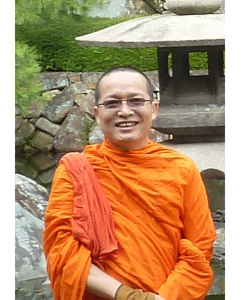 “Our action as leaders or representatives of faiths may not be able to cure those affected by HIV and AIDS, but it can help to prolong their lives and live peacefully in their own communities, and also decrease further spread of the disease.”
“Our action as leaders or representatives of faiths may not be able to cure those affected by HIV and AIDS, but it can help to prolong their lives and live peacefully in their own communities, and also decrease further spread of the disease.”
-VEN. DR. PHRAMAHA BOONCHUAY DOOJAI
Dr. Phramaha Boonchuay Doojai is a Buddhist monk and chairperson of the Asian Interfaith Network on AIDS (AINA). Dr. Doojai also serves as director of Thailand’s Chiang Mai Buddhist College, and is deeply committed to addressing the challenges of HIV and AIDS, as well as violence against women, humanitarian crises and migration issues.
Dr. Doojai has brought together Buddhist, Christian, Hindu and Muslim representatives through his work with AINA, which was established in 2005 with support from the Christian Conference of Asia. In establishing, strengthening and promoting country-level interfaith HIV/AIDS networks, Dr. Doojai has built the capacity of faith-based organizations to respond to the HIV/AIDS epidemic and create a supportive environment for faith-based responses to HIV/AIDS. He has also worked to overcome discrimination against those affected by HIV/AIDS and provides training to religious leaders and faith-based organizations from numerous Asian countries to combat stigmas associated with the disease.
For many years, Dr. Doojai has worked to build awareness of HIV/AIDS, maternal health, youth and migration, violence against women and humanitarian crises. He believes it is the duty of faith-based organizations and religious figures to collaborate with development organizations on a holistic approach that address these critical issues. Through his innovative “monknet” project – a network led by Dr. Doojai that provides HIV care – hundreds of Thailand’s monks have played a key role in reducing HIV infection rates.
Dr. Doojai is committed to educating and mobilizing leaders to advocate, educate and lead their faith communities in stemming spread of HIV/AIDS. Through AINA, Dr. Doojai equips these leaders to provide accurate, fact-based information on preventing new HIV infections while emphasizing the faith-based values and teachings that also contribute to reducing infections. He is committed to crafting interfaith partnerships with positive networks at local, regional and national levels, and to expand partnerships with governments, agencies and other NGOs.
